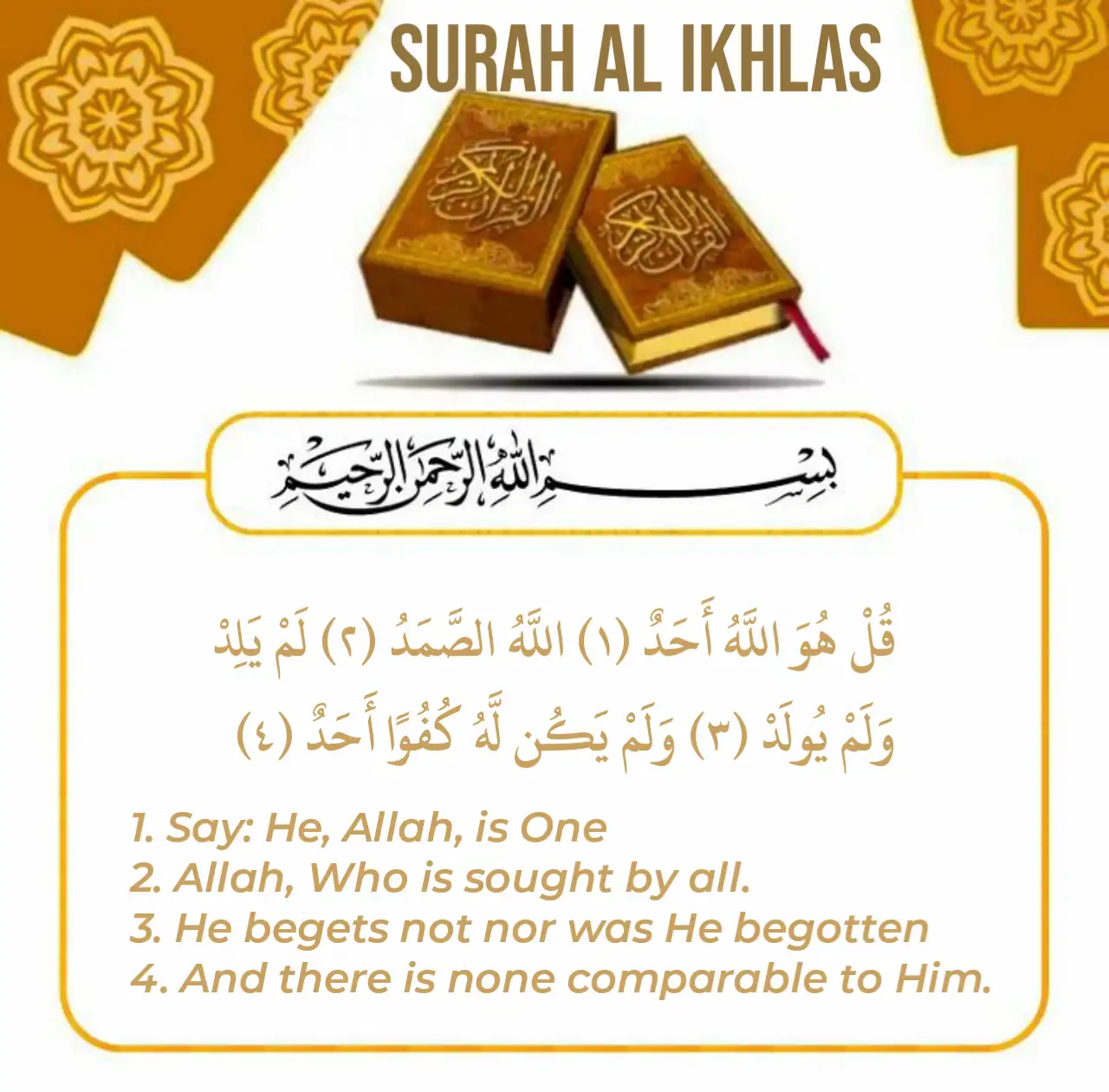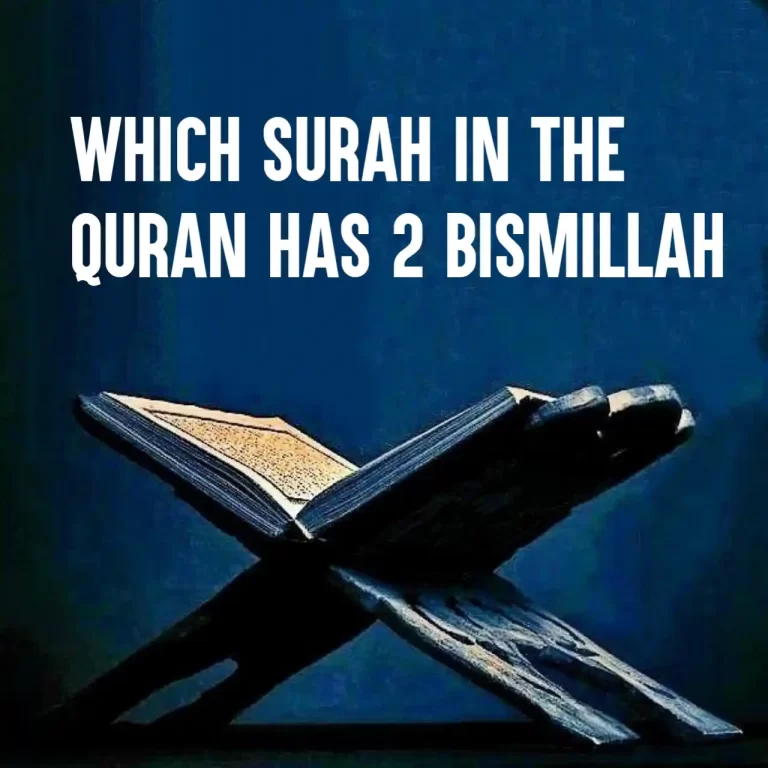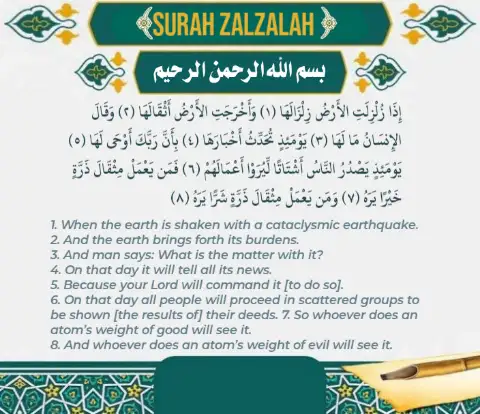Qul Huwallahu Ahad Surah Meaning, Arabic & Transliteration (Surah Al Ikhlas)
Qul Huwallahu Ahad Surah which name is surah Al Ikhlaa (Sincerity), also known as the Declaration of God’s Unity and al-Tawhid (Monotheism), is the 112th chapter of the Quran.
Advertisements
Here is everything you need to know about this beautiful and wonderful surah.
Qul Huwallahu Ahad Surah In English
- Say: He, Allah, is One.
- Allah, Who is sought by all.
- He begets not nor was He begotten
- And there is none comparable to Him.
Surah Al Ikhlas Transliteration
- Qul huwal Lahul Ahad
- Allahus Samad
- Lam yalid walam yuulad Walam yakun lahu qufwan Ahad.
Surah Al Ikhlas In Arabic Text
بِسْمِ ٱللَّهِ ٱلرَّحْمَـٰنِ ٱلرَّحِيمِ
- قُلْ هُوَ اللَّهُ أَحَدٌ (١)
- اللَّهُ الصَّمَدُ (٢)
- لَمْ يَلِدْ وَلَمْ يُولَدْ (٣)
- وَلَمْ يَكُن لَّهُ كُفُوًا أَحَدٌ (٤)
Ikhlas Surah other Names
This surah has been known by several other names, among them:
- At-Tawheed – the surah which states that Allah is one.
- At-Tafreedh – the surah stating that Allah is unique, with none comparable to Him.
- At-Tajreed – the surah which removes all false concepts about Allah.
- Al-Asas – the surah which is the foundation, essence, or core of Allah’s message to mankind.
Summary Of Surah Qul Huwallahu Ahad
| Classification | Meccan |
| Names | Perfection The unity, Oneness of God |
| Number of verses | 4 |
| Surah Before | Surah Al Masad |
| Position | 30 juz |
| Order | 112 |

Why Was Surah Al Ikhlas Revealed?
The reason for this Surah being revealed is that polytheists or the Jews said to the Prophet SAW to describe His Lord for them. So Allah revealed this surah in reply.
Advertisements
This is addressed to the Messenger specifically and to the whole nation generally.
Tafsir Or Meaning Of Surah Al Ikhlas
The meaning here is that Allah, Whom you are speaking and asking about, is “One” in His majesty and greatness; them is no one like Him and He has no partner. Rather, He is single and alone in His greatness.
He is the One and unique, to Whom alone belongs utmost perfection; to Him belong the most beautiful names and perfect, sublime attributes, and His deeds are far above any shortcomings; He has no counterpart and no equal.
The Tafseer of Verse 2:
Allah, asSamad.
Advertisements
Thin is a separate sentence in which Allah explains that He is as-Samad.
The most comprehensive meaning that has been given is that it means He is perfect and complete in all of His andibutes and the One Whom all of His creatures are in need of and destitute before Him.
The inhabitants of both the upper and lower realms are in the utmost need of Him.
Advertisements
They ask Him for what they need and turn to Him regarding that which concerns them, because
- He is the only One Who is perfect in His attributes,
- the All-Knowing Who is perfect in His knowledge,
- the Forbearing Who is perfect in His forbearance,
- the Most Merciful Who is perfect in His mercy, Whose mercy encompasses all things… and so on with all His attributes.
It has been reported that Ibn Abbas said as-Samad means He Who is perfect and complete in Hie knowledge, His leniency, His honor and might, His capability, to the end of what he mentioned in the narration.
This implies that Allah is completely self sufficient and in no need of any of the creations because He is perfect.
It has been reported that the Tafseer of as,Samad is the One Whom all the creations are constantly and eternally reliant upon in all of their needs.
They are destitute before Him.
So understanding this, the general meaning is He Who is perfect in all of His attributes, Whom all of the creations are destitute and in need of.
The Tafseer of Verse 3.
Because there is nothing similar or like Him in any way.
A son, for example, is derived from his father and a part of him as the Prophet SAW said about his daughter, Fatimah:
Indeed, she is a part of me.
As for Allah, there is nothing like Him.
Furthermore, a son is needed either to relieve some of the hardships of this life or to carry on one’s lineage; Allah is in no need at all for such things.
Thus He has no offspring because there is nothing similar to Him and because He is in no need of anyone for anything.
Allah has also pointed out the absurdity of having any children saying:
He is the Originator of the heavens and the earth. How can He have children when He has no wife? He created all things and He is the AllKnower of everything.
The birth of offspring would require someone to beget him yet He is the Creator of all things.
Furthermore, if He were the Creator of all things, then everything else would be a separate existence to Him.
This next statement of His contains a refutation of three deviated groups from among the children of Adam.
They are the polytheists, the Jews, and the Christians.
Some of the polytheists claimed the angels were females and the daughters of Allaah, while in fact they are nothing but true servants of the Most Merciful.
A faction of the Jews said uzair (Ezra) is the son of Allah and the Christians say the Messiah, (Jesus) is the son of Allah.
For this reason Allah declares them all to be liars saying,
He don not beget (offspring), nor was He born (of any parentage).
Because Allah is the First Whom there was never anything before Him. So how could He be born?
The Tafseer of Verse 4
Them is no one equal to Him in all of His attributes.
Allah negates from Himself that He is a father, a son, or that there is anything similar to Him.
This Surah contains a great virtue, the Prophet SAW said:
Indeed, it equals one-third of the Qur’an.
Hadith
It equals a third of is but this does not mean it actually takes the place of one-third of the Quran.
That’s why, if a person were to repeat it three times in his obligatory prayers, this would still nor be sufficient as taking the place of Surah Fatiha, for example, which is required to be recited in the prayers.
On the other hand, if he recites it three times, it is as if he has recited the whole Quran but he is not rewarded with the same reward as if he did actually read the entire Qur’an.
It is not strange that something could be equivalent to something else yet nor be rewarded with the same reward nor takes it place.
Another example is the statement of the Prophet SAW when he said that whoever says:
La ilaha illa Allah wahdahu la sharika lah, lahul mulk wa lahul hamd wa huwa ala kulli shai’in qadeer.
Meaning: Nothing has any right so be worshipped except Allah alone with no partner. To Him belongs the kingdom and all praise and He is capable of anything.
“Then it is as if has freed four slaves from the lineage of Ismaa ‘eel (Ishmael) or the sons of IsmaeeL°
Even with this, if a person had a legal obligation to free a slave as an expiation for some sin he had committed and then he were say this, this would not take the place of and fulfill his obligation of actually freeing the slave.
So just because something may be equal to another in some way, that does not necessarily mean it completely takes its place and its same reward.
The Messenger SAW used to recite this Surah during the second Rak’ah of the optional prayers before the obligatory Fajr’ and Maghribi prayers as well as during the prayer after making Tawwaf, or circulating the Ka’aba in Mecca.
He used to also recite it during the optional night time Witr prayer because it contains complete sincerity and sole worship for Allah alone.
Thus, it has been named Surah lklaas, or Sincerity.
This surah refers to the oneness of the divine names and attributes (tawheed al-asma’ was-sifdt).
Hadith Related To Surah Qul Huwallahu Ahad
According to different hadiths, this surah is an especially important and honored part of the Quran.
- Abu Said Al Khudri reported that A man heard another man reciting (in the prayers): surah Qul Huwallahu ahad Surah, And he recited it repeatedly. When it was morning, he went to the Prophet and informed him about that as if he considered that the recitation of that Sura by itself was not enough. Allah’s Messenger said, “By Him in Whose Hand my life is, it is equal to one-third of the Quran.
- Narrated Aisha Radiyallahu Anha: The Prophet SAW sent (an army unit) under the command of a man who used to lead his companions in the prayers and would finish his recitation with Surah qul Huwallahu ahad. When they returned (from the battle), they mentioned that to the Prophet. He said (to them), “Ask him why he does so.” They asked him and he said, “I do so because it mentions the qualities of the Beneficent and I love to recite it (in my prayer).” The Prophet; said (to them), “Tell him that Allah loves him.
- Imam Bukhari reported from Amrah bint AbdurRahman, who used to stay in the apartment of Aisha, the wife of the Prophet, that Aisha said, “The Prophet sent a man as the commander of a war expedition and he used to lead his companions in prayer with recitation (of the Quran). And he would complete his recitation with the recitation of Surah qul Huwallahu ahad.’ So when they returned they mentioned that to the Prophet and he said, Ask him why does he do that? So they asked him and he said, “Because it is the description of ArRahman and I love to recite it. So the Prophet said, “Inform him that Allah the Most High loves him.
- An authentic Hadith says recite Surah al Ikhlas and al-Muawwidhatayn (Surat al-Falaq and Surat an-Nas) three times in the morning and the evening; they will suffice you from everything.’
[Narrated by At-Tirmidhi 2829]
- Narrated Aisha: “Whenever the Prophet went to bed every night, he used to cup his hands together and blow over it after reciting Surah al Ikhlas, Surah al-Falaq and Surah an-Nas, and then rub his hands over whatever parts of his body he was able to rub, starting with his head, face and front of his body. He used to do that three times.
This is the end of the commentary on Surah al Ikhlas.
All praise and thanks are for Allah, and may the blessings and peace of Allah be upon Prophet Muhammad (peace be upon him), his family, and his Companions abundantly until the Day of Judgement
Advertisements








7 Comments